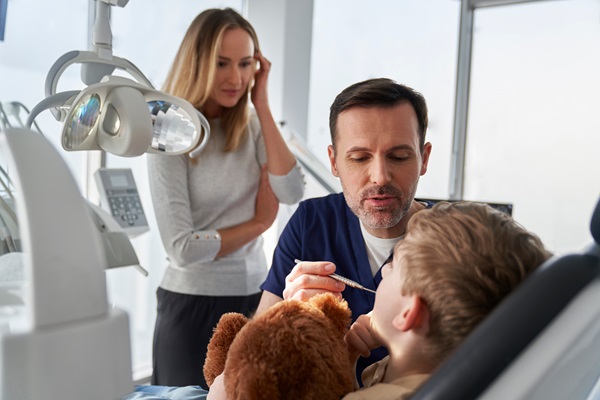Ask a Family Dentist: What Is an Abscessed Tooth?

An abscessed tooth can occur for a variety of reasons, and most require prompt treatment from a family dentist. It is important to understand what an abscessed tooth is, what the early symptoms are and how a family dentist might treat an abscessed tooth to be able to recognize the concern when it develops and know what to expect during treatment.
An overview of abscessed teeth from a family dentist
A family dentist can diagnose and treat an abscessed tooth. They also provide insights into how patients can prevent future instances of an abscessed tooth through good oral hygiene. The following is everything to know about what an abscessed tooth is and how a family dentist can treat it in an effective manner.
What is an abscessed tooth?
An abscessed tooth is a pocket filled with pus that develops as a result of a tooth infection. It can be the result of a variety of oral health concerns, including cavities, tooth damage, and gum disease. An abscessed tooth develops when the pulp in the root of a tooth becomes infected. The infected pulp then forms a pocket of pus, which can worsen, and the infection can spread if it is not dealt with properly and in a timely manner.
Symptoms of an abscessed tooth
It is important to recognize the early symptoms of an abscessed tooth to reduce the risk of the infection becoming more severe. Detecting symptoms early can also make the treatment needed less invasive in many cases. The more common symptoms to watch for include:
- Swollen gums
- Pain in the affected area
- Red and tender gums
- Bad taste in the mouth
A more severe abscessed tooth can also include a fever and swollen lymph nodes, as well. If these symptoms exist, then contacting your family dentist to discuss treatment options is encouraged.
Abscessed tooth treatment options
There are several options for treating an abscessed tooth. The recommended form of treatment depends on the severity of the infection. Family dentists may recommend one or more of the following treatment options:
- Antibiotic treatment
- Drain the abscess
- Clean around the affected area
- Root canal therapy
Additional treatment may be required depending on the condition of the tooth. For example, the patient may require a dental crown following root canal therapy.
Tips for abscessed tooth prevention
There are oral care tips that individuals can implement daily to minimize the risk of an abscessed tooth. Most notably, practicing good oral hygiene through brushing, flossing, and using mouthwash as directed by your family dentist is important. It is also encouraged to limit foods and drinks that contain high levels of sugar and other carbohydrates, along with visiting the family dentist for all scheduled check-up visits.
What to do if symptoms of an abscessed tooth develop
It is important not to ignore the symptoms of an abscessed tooth. If any symptoms develop, then contact a dentist as soon as possible to schedule a visit. Otherwise, the symptoms (including discomfort) can worsen and may even lead to more severe concerns, such as an oral infection that spreads to other parts of the mouth.
What to expect during a visit for abscessed tooth treatment
The first step the dental staff will take is to fully evaluate the affected tooth to determine if there is an abscess or other oral health concerns. From there, they can provide a treatment recommendation. They can also help alleviate the discomfort and may schedule a follow-up visit to properly treat the tooth. In some cases, they can treat the abscessed tooth on the first visit (depending on its severity).
How to determine the best treatment option for an abscessed tooth
The dentist can provide a professional recommendation for treatment based on the severity of the abscess. For severe abscesses, the dentist may recommend a root canal procedure to ensure the abscess is properly removed. In other cases (and in the most severe cases), the dentist may recommend tooth removal, followed by tooth replacement. For less severe instances, the dentist may recommend antibiotic treatment as well as a recommendation to help protect the tooth from future abscesses. Restorative procedures such as cavity fillings may be recommended as well.
A family dentist can treat an abscessed tooth
If you have symptoms of an abscessed tooth, now is the time to take action. Early treatment can prevent future health issues. Our family dentist team can help you through the treatment process, and we encourage you to reach out to us today for more information on the next step to take.
Are you considering a family dentist in the Castle Rock area? Get more information at https://www.foundersdental.com.
Check out what others are saying about our dental services on Yelp: Family Dentist in Castle Rock, CO.
Recent Posts
Your dentist is your partner in maintaining oral health and overall wellness. Not every type of dentist is exactly alike though. A family dentist is a special type of dentist that can see all the members, both young and old, of an entire family. Finding a family dentist to partner with your entire family is…
Are you looking for a family dentist? Read on to learn what questions you should ask before selecting a family dentist. A consultation visit with a family dentist offers a way to learn more about the dental practice you are considering and see if they and their dental team are a good fit for what…
Is your little one in need of a children dentist near me? Visiting the dental office for the first time does not need to be a stressful experience. Understanding what happens during the first appointment can help kids and their families feel confident and prepared for this important developmental milestone.Early dental visits support a young…
Dental emergencies can happen without warning, leading to pain and the need for immediate care. An emergency dentist is there to provide swift treatment for unexpected dental problems, helping to relieve discomfort and prevent further complications. Whether it is a sudden injury or a worsening condition, quick attention can make all the difference.Dental emergencies vary…


